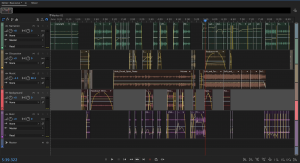First Words – Podcast in Review
This project, without a doubt, was the most demanding undertaking of the semester. That said, it has also been one of the most fulfilling. Taking the semesters theme of ‘ecologies of attention’ into account we followed media attention to the 2016 election to use it as a narrative to divulge how coverage methods can alter audience opinion of a public figure. This research path lead us to actually articulate a more dispersed narrative that starts with Warren G Hardings election and travels through to George W Bush’s re-election to communicate methods of presenting candidates and how coverage patterns can divert or affirm the attention of the public. This was interspersed with discussions of the 2016 election, bringing in new media like Twitter and Facebook into the discussion of our attention. Our goal was to use all the presidents, and the coverage of their presidential campaigns, to look at how information dispersion methods can effect how an audience pays attention to the content.
I think we managed to encase the overarching theme of ‘ecologies of attention’ into the narrative really well; the discussion doesn’t really address the topic directly, but the discussion of how mediation of the candidates were conducted really adheres to the communication process being one that can shape the information it holds. I believe we perhaps have too much content for such a small audio piece however. Whilst the narrative really consolidates the topic well, the movement from one subtopic to the next happens rapidly and doesn’t leave as much time as would be desired to simply mull over the information that is being divulged. Biting off more than I can chew is not new to me, but editing I appreciated that I was overcrowding the canvas somewhat with information and as a result the piece has less breathing room than would be desired. The narrative itself I am proud of and it is an abstract look at how communication can be a destructive process. The chronicle aspect really expresses the real world impact of the communication industry as a whole. This also allowed us to travel through a variety of soundscapes and incorporate audio from speeches we were discussing, making the topic feel well rounded and textured. It is only the pacing that I feel makes the piece somewhat underdeveloped.
As a first exploration of expressing narrative in sound this was an interesting experiment for me. I think part of what makes our podcast successful is that there is no way to turn it into a visual one without completely rearranging the narrative. This project taught me that great narratives need to be born within their medium and thats what we explored with this piece; creating a narrative whose composition was born within sound. We used radio noises to move our narrative through time and space and I found that change of pacing and distance in sound was the form of editing we needed to give our podcast a sense of movement and progress. Moving our narrative through different time periods and between discussion and narration caused us to see editing as a spacial and temporal concept, as we needed to give each segment a sense of closure but had no visual method of doing so.
Audio managed to give our production a lot of freedom in the content we layered in, as the rapidity of its travel from concept to concept, along side the speeches and dialogue woven throughout the piece, works selectively within the medium of sound. Visually this approach would have been jarring, but the transitions and overlapping voices of the piece work really effectively within an audio environment.
This piece not only marked a beginning for work within sound, but it also was the first group project of the course. This came with an appreciation of being a piece of a larger puzzle. A large part of what I learnt within the project was distributing tasks and segregating research, eventually to reintegrate it again. Making a single coherent work that reflects an equal participation of a team of 3 is not an easy feat, but being allocated to such a motivated group made each roadblock something we could work together to fix. This made me realise a communal attitude is all that is necessary to fuel a well functioning unit. Once that is in place, you have a collection of different minds ready to create a piece of work that is far more thoroughly developed (both practically and conceptually) than anything you could have achieved on your own. Upfront discussion about strengths and weaknesses not only leads to more understanding, but also results in practical delegation of tasks that lets a project benefit from the strengths of its participants, whilst making up for each individuals weaknesses.
Over all the project was an experiment in both practical and conceptual creation that has not only bolstered my skills, but has given me a better understanding of my own interactions within an industry setting. The podcast itself could be improved, but I doubt the experience of making it could be.
